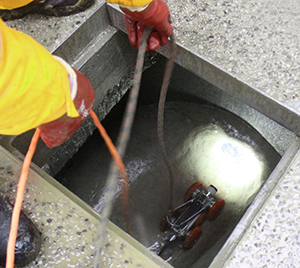Lanes Group plc has completed a three-year programme of maintenance work to survey, clean, and repair strategic highway drainage pipes across Portsmouth.
 Teams from the drainage specialist’s Eastleigh depot worked with Colas to carry out surveys, desilting, and repairs along 20 kilometres of large-diameter highway drains.
Teams from the drainage specialist’s Eastleigh depot worked with Colas to carry out surveys, desilting, and repairs along 20 kilometres of large-diameter highway drains.
Colas, which manages highway infrastructure for Portsmouth City Council via a Private Finance Initiative (PFI), commissioned Lanes to carry out the work as part of a process of incorporating the main drainage pipes along strategic routes into its maintenance programmes.
Colas Operations Manager Stephen White said: “Initially, CCTV drainage surveys carried out by Lanes helped us identify the large-diameter, strategic highway drains we have an obligation to maintain.
“The asset condition data and detailed drainage maps they provided us with, allowed remedial works to be programmed accordingly.
“We needed to work with a drainage contractor that had the capabilities and capacity to provide long-term support, and dovetail their operations seamlessly with ours.
“Lanes achieved that by working flexibly with our own teams, and creating a data reporting system that mirrored our own, which made the drainage maintenance process as simple and efficient as possible.”
Services delivered over the three-year period included highway drainage line desilting and root cutting, CCTV drainage surveys, drainage system mapping, and pipe rehabilitation through the installation of structural point liners.
The drainage pipes were among the largest along Portsmouth’s highway network, ranging in diameter from 500mm upwards.
Matt Griffith, Regional Manager of Lanes Eastleigh, said: “Our drainage work was targeted at the some of the busiest stretches of road and the most important transport intersections in Portsmouth.
“Colas wanted to be sure that the highway drainage pipes along these sections of the road network were in optimum condition to protect against flash flooding, especially during the coming winter months.”
The Lanes drainage engineers worked mostly at night to minimise the impact of their work on the travelling public, under traffic management organised and managed by Colas.
Asset condition surveys were carried out using robotic CCTV drainage survey cameras. Data was used to plan a programme of remedial drainage repairs.
Problems with highway drainage lines discovered included root ingress, which cracked or blocked pipes, dislodged pipe joints, and partially-collapsed pipes.
In the final phase, carried out between October 2016 and June 2017, more than 500 cure in place pipe lining (CIPP) repairs were carried out at 21 specific locations.
Point liners, also known as patch liners, which are glass fibre sleeves impregnated with resin, were installed in the pipe at the point where it had been damaged.
The sleeve was inflated against the pipe until the resin had hardened, or cured. This created a tough new pipe within a pipe extending the lifespan of the pipe by up to 50 years.
Colas maintains 21,316 highway drainage gullies as part of its PFI contract with Portsmouth City Council, which also covers maintenance of highways infrastructure, including pavements, safety barriers, fencing, road markings, bollards, street cleansing, and structures.
